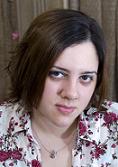What is the best piece of advice you ever received as a young writer?
 "To be honest, I've always been one to disregard writing advice. There are so many great writers out there, and they all have a different process that works for them. What reaps results for a bestselling author can be the downfall of another. It's important that every writer finds the process that works for him or her." - Lauren Destefano, author of Wither.
"To be honest, I've always been one to disregard writing advice. There are so many great writers out there, and they all have a different process that works for them. What reaps results for a bestselling author can be the downfall of another. It's important that every writer finds the process that works for him or her." - Lauren Destefano, author of Wither. 
"Be honest. Be honest with yourself, with your work, and with your readers." - Shaun David Hutchinson, author of The Deathday Letter.

"It is vastly unrepeatable, so I'll do my best to edit it: 'Get the frick on the frick.' It's a constant reminder to myself to just sit down and write. Don't second guess yourself, don't worry about what your character will or won't do, don't stand around and think about writing, just put your hands on the keyboard and write. I have a tendency to worry and procrastinate, so sometimes I need a jump start." - Robin Benway, author of The Extraordinary Secrets of April, May, and June.
"'Write like there’s no one watching,' Martha O’Connor, author of The Bitch Posse. In other words, don’t self-censor. Stay true to the story, and get it all down." - Jackie Kessler, author of Rage.
 "One of my early writing teachers, the writer Mitch Wieland, often emphasized that you should write without thinking of publication. Instead, work to make your writing up to the level of art. I really latched onto this idea, and think about it a lot even when I write genre fiction." - Cynthia Hand, author of Unearthly.
"One of my early writing teachers, the writer Mitch Wieland, often emphasized that you should write without thinking of publication. Instead, work to make your writing up to the level of art. I really latched onto this idea, and think about it a lot even when I write genre fiction." - Cynthia Hand, author of Unearthly.
"Nothing shows you where you’ve been too wordy, lofty, or you’re lacking details like reading your work out loud. Do it!" - Judith Graves, author of Under My Skin.
"The most helpful bit of advice I ever received was bad advice. 'Maybe you should put as much effort into your dayjob as you do your writing. You’d be CEO of this company in no time.' Someone actually said that to me. And I thought, 'Oh, GAWD, I would rather DIE than be CEO of this company…' And my desire to write was renewed." - Rae Carson, author of The Girl of Fire and Thorns.
"Always be willing to revise. Don’t let arrogance prevent you from seeing the flaws in your work, or it will never get better." - Veronica Roth, author of Divergent.
"Your voice is your voice. No one else has it, and no one else can tell your story." - Myra McEntire, author of Hourglass.
"Trust your voice. Don't try to get Mega Angst Cakes if you're funny because you think funny won't sell. Be the only writer you know how to be!" - Rachel Hawkins, author of Demonglass.
 "I still feel like a pretty new writer, so I’ll go with the first writing advice I ever received. A few days after I began The Unbecoming of Mara Dyer, I emailed my very good friend who wrote a novel herself. I was panicked and had no clue how to go about this whole writing thing, and she told me wisely and simply: 'get it all down.' And that was the best advice I received, I think. Finish the book." - Michelle Hodkin, author of The Unbecoming of Mara Dyer.
"I still feel like a pretty new writer, so I’ll go with the first writing advice I ever received. A few days after I began The Unbecoming of Mara Dyer, I emailed my very good friend who wrote a novel herself. I was panicked and had no clue how to go about this whole writing thing, and she told me wisely and simply: 'get it all down.' And that was the best advice I received, I think. Finish the book." - Michelle Hodkin, author of The Unbecoming of Mara Dyer. 
"The concept of 'shitty first drafts' from reading Ann Lamott's must-read book on the writing process, Bird by Bird. I used to write slowly and carefully. Now I'm a big believer of writing faster and getting that." - Sarah Darer Littman, author of Life, After.
"Find your voice. Voice is the key to good fiction. Everything else can be learned, honed, and acquired, but voice comes from the heart. Here's editor Cheryl Klein of Scholastic on voice." - Mitali Perkins, author of Bamboo People.
"Revision is what separates the writers from the dabblers. Be a real writer." - Emily Wing Smith, author of The Way He Lived.
"Actually, it was more like anti-advice. I had a teacher who basically said that no one ever makes it as a writer. In his words it was like trying to be a 'rock star,' so none of us should even bother. But what I heard was: I dare you to try!" - Kimberly Derting, author of Desires of the Dead.
"'No writing is wasted effort.' In other words, even a scene that ends up on the 'cutting room floor' had its purpose--maybe it helped you understand your character better, or provided some backstory in your mind that helps flesh out the story told on the page." - Kristi Cook, author of Haven.

"Not really advice, but it was so beneficial for me just to be given the freedom and support to write, and to be taken seriously at a young age. I went to a magnet high school where I majored in literary arts. We had to learn proper things like story structure and iambic pentameter, but we were also given twenty or thirty minutes every day where we just wrote whatever we wanted in our journals. We were given a grade for how many pages we wrote each week, but no one ever read it. It was amazing to have that freedom and to be told that it was important just to practice and explore." - Holly Hoxter, author of The Snowball Effect.
Come back Tuesday to find out if the authors have ever blown off a social event to hand put with their characters!



















































No comments:
Post a Comment